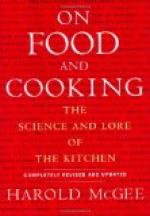It is thus apparent that much care should be exercised in the selection and combination of food materials. The table on page 484, showing the nutritive values of various foods, should be carefully studied. Such knowledge is of first importance in the education of cooks and housekeepers, since to them falls the selection of the food for the daily needs of the household; and they should not only understand what foods are best suited to supply these needs, but how to combine them in accordance with physiological laws.
CONDIMENTS.—By condiments are commonly meant such substances as are added to season food, to give it “a relish” or to stimulate appetite, but which in themselves possess no real food value. To this category belong mustard, ginger, pepper, pepper sauce, Worcestershire sauce, cloves, spices, and other similar substances. That anything is needed to disguise or improve the natural flavor of food, would seem to imply either that the article used was not a proper alimentary substance, or that it did not answer the purpose for which the Creator designed it. True condiments, such as pepper, pepper sauce, ginger, spice, mustard, cinnamon, cloves, etc., are all strong irritants. This may be readily demonstrated by their application to a raw surface. The intense smarting and burning occasioned are ample evidence of the irritating character. Pepper and mustard are capable of producing powerfully irritating effects, even when applied to the healthy skin where wholly intact. It is surprising that it does not occur to the mother who applies a mustard plaster to the feet of her child, to relieve congestion of the brain, that an article which is capable of producing a blister upon the external covering of the body, is quite as capable of producing similar effects when applied to the more sensitive tissues within the body. The irritating effects of these substances upon the stomach are not readily recognized, simply because the stomach is supplied with very few nerves of sensation. That condiments induce an intense degree of irritation of the mucous membrane of the stomach, was abundantly demonstrated by the experiments of Dr. Beaumont upon the unfortunate Alexis St. Martin. Dr. Beaumont records that when St. Martin took mustard, pepper, and similar condiments with his food, the mucous membrane of his stomach became intensely red and congested, appearing very much like an inflamed eye. It is this irritating effect of condiments which gives occasion for their extended use. They create an artificial appetite, similar to the incessant craving of the chronic dyspeptic, whose irritable stomach is seldom satisfied. This fact with regard to condiments is a sufficient argument against their use, being one of the greatest causes of gluttony, since they remove the sense of satiety by which Nature says, “Enough.”




